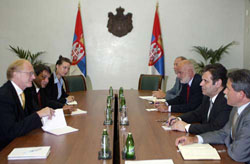Ethnic Albanian, Serbian officials continue talks on Kosovo's status
Ethnic Albanian and Serbian officials staked out their positions as U.N.-mediated talks resumed Friday in an effort to determine the future status of ethnically tense Kosovo. The two delegations sat across from each other for the second round of talks alongside U.N. mediators pushing to find a lasting solution to one of the most intractable issues left since the disintegration of Yugoslavia whether Kosovo becomes independent or not.

The process is being mediated by former Finnish President Martti Ahtisaari, appointed by the United Nations to steer the talks toward an agreement by the end of the year. The one-day round of talks will be chaired by Ahtisaari's deputy, Albert Rohan. The talks on Friday will not deal directly with the question of the province's disputed status.
Instead, they will focus on the details of local government reform to give Serbs more of a say in areas where they live and on the links between the beleaguered Serb minority and Belgrade . Kosovo's ethnic Albanians, who comprise about 90 percent of the province's population of 2 million, insist on full independence. But Serbia and Kosovo's Serb minority insists Belgrade must retain some control over the province, which it claims is an integral part of the nation and the century-old birthplace of its national identity.
The province has been run as a U.N. protectorate since 1999, when NATO launched air strikes to end a crackdown by then Yugoslav President Slobodan Milosevic on separatist ethnic Albanian rebels. "We expect to see how serious is the Albanian side in the sense of being ready to accept at least the basis of our demands on decentralization," said Leon Kojen, a member of Serbia 's delegation, as he entered the building. "I think today is the moment that that will become clear."
Hashim Thaci, the leader of the ethnic Albanian's delegation, insisted the province must gain independence, but also said his negotiating team will try to find common ground with the Serb delegation. "No one can stop the future of democratic Kosovo," Thaci said. "Its dark past will be buried tomorrow with Milosevic in Serbia ," said Thaci, who was the leader of ethnic Albanian rebels during the province's 1998-1999 war with Serb forces.
"We don't expect that both sides agree on all issues," said Hua Jiang, Ahtisaari's spokeswoman. "On some issues we will find a common ground, on some others more time and discussion will be needed." Thousands of people died and hundreds of thousands were displaced during the war, and the end of hostilities did not bring the two sides any closer to a resolution.
Jiang said the U.N. mediators were expecting a more constructive discussion, with both sides more focused on the agenda and less on past grievances. However, the two sides have disagreed so far over how much power should be held locally, with Serbian officials insisting the province's Serbs be allowed to run affairs in their communities, link up with other Serb areas and have special ties to Belgrade .
Ethnic Albanians have rejected ideas of Serb municipal clusters, which would provide direct control of the police forces and justice systems, saying that would lead to the ethnic partition of the province. Aleksandar Simic, a member of the Serbian negotiating team, said the talks will center around the creation of a Serb entity in the province and its links to Belgrade . He also complained about Thaci leading the ethnic Albanian delegations. Serbs have accused Thaci of perpetrating war crimes.
Calling Thaci's appointment to head the team a provocation, Simic said Serbs "will not be forced away from the negotiating table." Kojen said Serbia 's delegation lodged a formal complaint with U.N.-mediators Friday, protesting Thaci's presence.
Thaci, who is also the leader of Kosovo's main opposition party, ruled out "the creation of any ethnic strips or pockets in Kosovo." "Kosovo's territorial integrity will be respected and guaranteed," Thaci told The Associated Press ahead of the talks, reports the AP.
N.U.
Subscribe to Pravda.Ru Telegram channel, Facebook, RSS!




